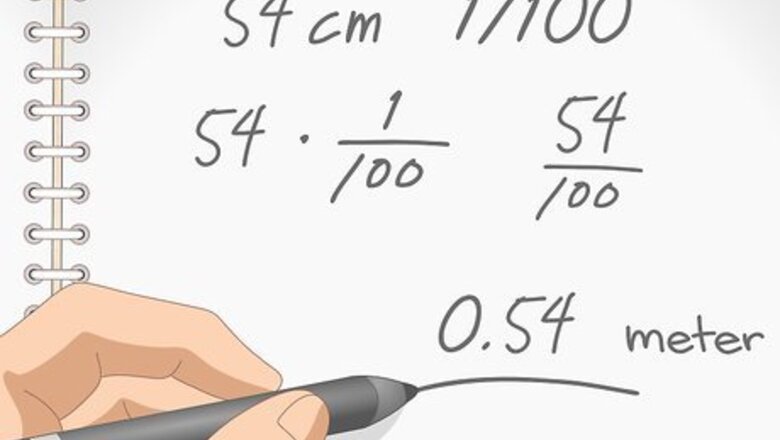
views
Converting from Centimeters to Meters
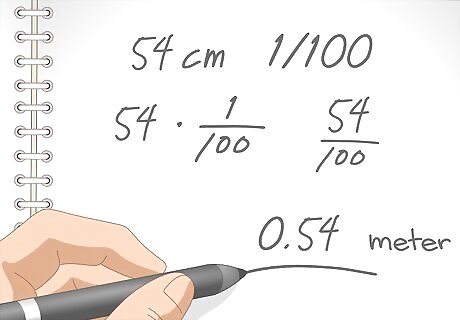
Interpret “centimeter” as “1/100 meters” when you see it. The prefix “centi-” means “one-hundredth,” so a centimeter equates to 1/100 of a meter. This means that converting from centimeters to meters always involves dividing by 100. Similarly, converting from meters to centimeters always involves multiplying by 100. Likewise, a millimeter is 1/1000 meters (since “milli-” means “one-thousandth”) and a kilometer is 1000 meters (since “kilo-” means “one thousand”).
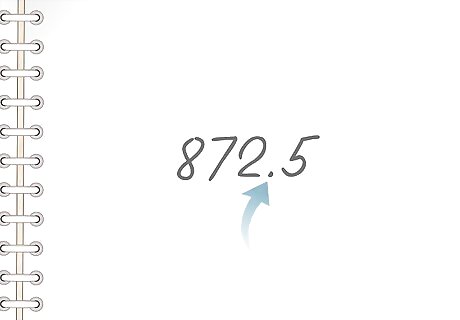
Locate the decimal point or inferred decimal point in your starting number. For instance, if your starting measurement is 872.5 centimeters (cm), then the decimal point is clearly located between the 2 and the 5. However, if your starting measurement is 63 cm, then the decimal point is inferred—to make it visible, rewrite the number as 63.0 cm. The decimal point always appears between the “ones” (to its left) and “tenths” (to its right) place values in a number. In 82.5, for example, 2 is in the ones place and 5 is in the tenths place. If your starting measurement is written as a fraction, such as 872 ½ cm, rewrite it in decimal form as 872.5 cm. Similarly, 4 ¼ cm equals 4.25 cm, and 4 ⅓ cm is approximately 4.33 cm.
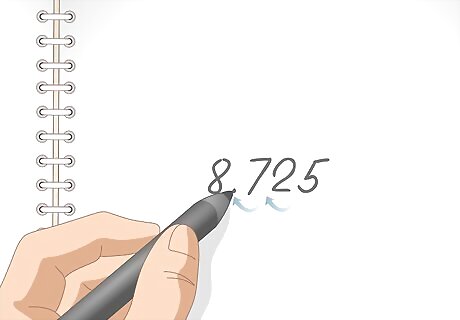
Slide the decimal point 2 spaces to the left. In the case of 872.5, moving the decimal point 2 spaces to the left results in 8.725. This is the measurement in meters, so your answer is 872.5 cm = 8.725 m. If your starting measurement is 63 cm (that is, 63.0 cm), sliding the decimal 2 spaces to the left results in 0.63. Therefore, 63 cm = 0.63 m.
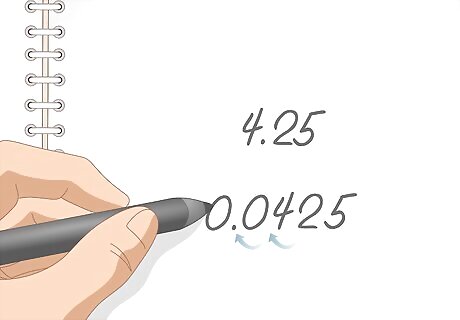
Add zeros to the left as needed when sliding the decimal point. For example, if your starting number is 4.25 cm, there’s only one digit to the left of the decimal point. In this case, add a zero to the left as you slide the decimal point over. Therefore, 4.25 cm = 0.0425 m. Similarly, 0.3 cm = 0.003 m.
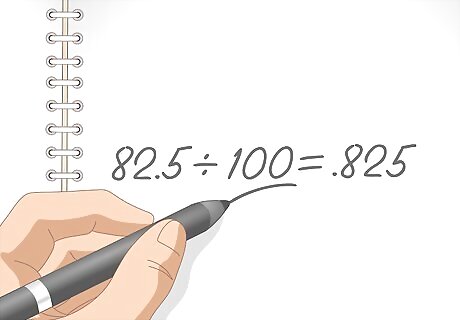
Divide the number of centimeters by 100 for a quick solution. If you don't want to mess around with place value, simply divide the number of centimeters by 100 to figure out how many meters it equals. For instance, converting from 82.5 to 0.825 involves shifting the decimal point 2 place values to the left, which is the same as dividing by 100.
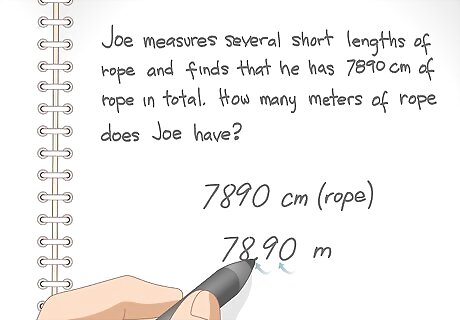
Practice doing word problems to build your skills. For example: “Joe measures several short lengths of rope and finds that he has 7890 cm of rope in total. How many meters of rope does Joe have?” There’s no obvious decimal point here, but remember that 7890 is the same as 7890.0. Move the decimal point 2 spaces to the left to get your answer: 7890 cm = 78.90 m. Completing a long division calculation for 7890 / 100 confirms this result.
Converting from Meters to Centimeters
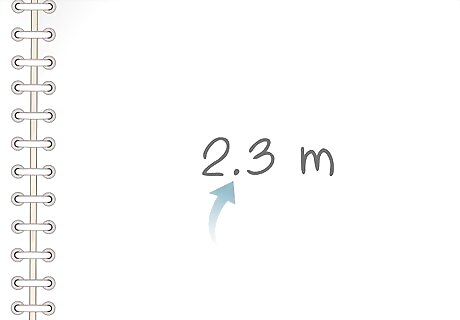
Locate the decimal point or inferred decimal point in the starting number. For example, if your starting measurement is 2.3 m, the decimal point is located between the 2 and the 3. However, if your starting measurement is 23 m, the decimal point is inferred to be after the 23. If you wish, you can rewrite 23 m as 23.0 m.
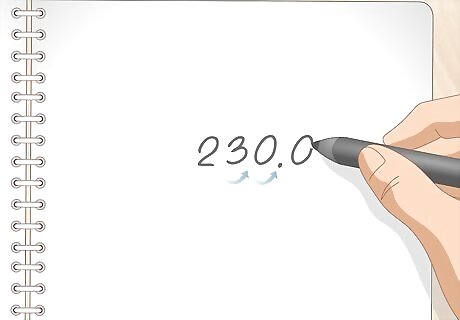
Slide the decimal point 2 places to the right. To convert from meters to centimeters, simply slide the decimal point 2 spaces in the opposite direction. For example: 2.3 m = 230 cm (add zeros to the right as needed) 0.45 m = 45 cm 12.2 m = 1220 cm 0.01 m = 1 cm
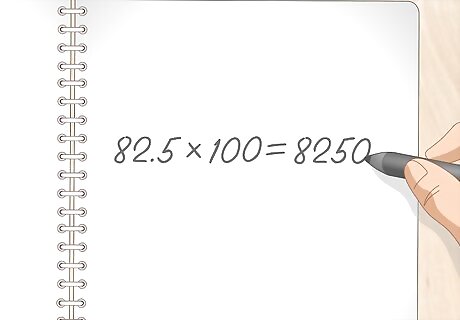
Multiply the number of meters by 100 for an alternative option. If you need to convert from meters to centimeters instead of the other way around, you must multiply by 100 instead of dividing by 100. As when dividing by factors of 10, the number of spaces (or “place values”) you slide the decimal point equals the number of zeros in the factor of 10 (the divisor). This time, though, you slide the decimal right instead of left. So, 82.5 x 100 = 8250, with the decimal point shifted 2 places to the right (which is equal to the number of zeros in 100). Similarly, 82.5 x 10 = 825 and 82.5 x 1000 = 82500.
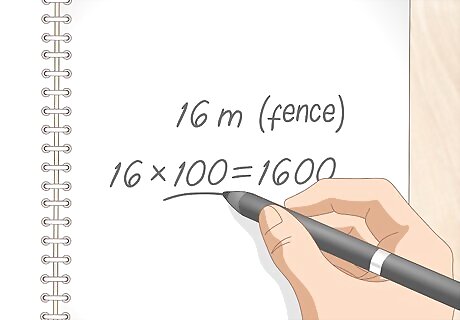
Practice doing word problems so you don’t get tripped up. Make sure you don’t move the decimal points the wrong direction when you’re converting from meters to centimeters (or vice versa)! Doing practice word problems is the best way to avoid this mistake. For example: “Henry’s old garden fence is 16 meters long, but the new fencing he wants to buy is sold by the centimeter. How many centimeters of fencing does Henry need?” Tip: You’re converting from meters to centimeters here, so you’ll need to move the decimal point to the right. Rewrite 16 as 16.0 so you can visualize the decimal point. Add another zero to the end (16.0 → 16.00) so you can slide the decimal point 2 places to the right. Therefore, 16 m = 1600 cm. Henry needs 1600 cm of fencing. Multiplying 16 x 100 confirms this result.


















Comments
0 comment